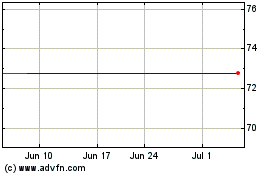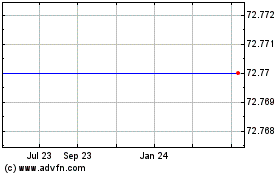By John D. Stoll
Vicki Hollub is an engineer who spent time on three continents
working her way up to the top of Occidental Petroleum Corp. She
doesn't have much experience at M&A, and that has made her an
easy target for critics.
Her recent bid to deepen the company's bet in the red-hot
Permian Basin is bold. Built on the $38 billion acquisition of
Anadarko Petroleum Corp., the expansion plan requires costly
capital from Warren Buffett -- money necessary to circumvent an
Occidental shareholder vote that Anadarko wanted to avoid.
Investors were unhappy, driving Occidental's shares down 15%, as
of Thursday evening, since it first made its Anadarko offer in late
April. And none is more loudly unhappy than billionaire activist
investor Carl Icahn, characterizing Ms. Holub as a rookie, calling
her arrogant and saying Mr. Buffett "took her to the cleaners."
There's plenty to question in the deal -- the cost of Buffett's
money, the end run around shareholders, the increased vulnerability
of the Occidental to falling oil prices -- but could Ms. Hollub be
facing more scrutiny from an activist because she's a she?
It's a touchy subject. Neither Mr. Icahn nor Ms. Hollub were
available to comment. In fact, of the 16 former and current female
CEOs, activist investors and institutional shareholders I contacted
about the topic, exactly zero agreed to talk on the record.
It's a subject that has come up before, but now there is
research that suggests that women CEOs are at higher risk of a
brush with an activist than their male counterparts. Because these
activists have the ear of institutional shareholders and strike
fear in the heart of board members, creating a concrete plan for
confronting these threats should top the to-do list of any female
CEO.
Nelson Peltz, a well-known activist who has targeted his share
of female CEOs, told CNBC he is "gender blind." Whether a firm
lives up to its potential is all he cares about, he says. If it's
performing up to expectations, he'll leave it be. If it ain't
making the numbers, he swoops in.
An investment banker who works on activist issues told me this
week that Messrs. Icahn and Peltz could look at three dozen or so
criteria in evaluating whether to launch a campaign against a
company. "Whether the CEO is a man or woman is absolutely,
positively not on that list."
Academics started taking a look for potential bias after a
string of prominent women leaders -- including Marissa Mayer (
Yahoo), Mary Barra (GM), Meg Whitman (HP), Indra Nooyi ( Pepsi) and
Sandra Cochran (Cracker Barrel) -- had battles with activists, who
are almost exclusively men. Former Mondelez International Inc. CEO
Irene Rosenfeld told The Wall Street Journal in 2015 that dealing
with Mr. Peltz consumed 25% of her time. Ursula Burns relinquished
Xerox Corp.'s CEO title after a confrontation with Mr. Icahn. Ellen
Kullman led Dupont's successful fight against Mr. Peltz in 2015,
but abruptly retired five months later amid deteriorating
results.
All the CEOs listed above declined to talk to me for this piece,
except Ms. Rosenfeld, who didn't respond. But many have addressed
the situation in the past.
Yale School of Management Professor Jeff Sonnenfeld told me that
directors also have long memories, citing Ms. Kullman's fate.
"Ellen won the proxy fight but still her board folded like lawn
furniture," Mr. Sonnenfeld said, referring to the company's
decision to reverse course after Ms. Kullman reported a weak
quarter of financial results.
The data indicates women are indeed far more likely to face an
activist challenge. One exhaustive study conducted by University of
Alabama researchers found 6% of male CEOs and 9.4% of female CEOs
were confronted by activists. The numbers are small, but they
indicate a woman CEO is 50% more likely to be targeted. The study,
published last year in the Journal of Applied Psychology, relied on
filings made by activist investors in public firms between 1996 to
2013.
Yet-to-be published research by professors at Georgia State
University and Arizona State University looked at 145 comparable
companies in the S&P 1500 where male and female CEOs operate
under similar circumstances. The data stretches back to 2003 and
shows women face a 27% chance of being targeted, while men face a
less-than-1% chance.
Researchers in both studies say they accounted for several
potential factors that could skew results or present an unclear
picture. They looked at whether the woman running a targeted
company was in the midst of a turnaround, for example. Was it her
first CEO post? Was she early in her tenure? Was her company
solidly profitable?
"Even when keeping everything equal, women are still a far more
likely target," said Sandra Mortal, the associate professor at
Alabama who co-authored one of the studies. Ms. Mortal said these
findings correspond with other evidence showing it's tougher for
females in the corner office, including data showing women are more
likely to be fired than male counterparts even when doing a good
job.
"The fact is, we just don't give females as long of a leash,"
said Abbie Griffith Oliver, a Georgia State professor who is one of
the authors of the yet-to-be-published study. "From an
activist-investor perspective, they may not view her as less
competent, but they don't give her as wide of a window."
In the case of Ms. Hollub, she has admitted she lacks M&A
experience, playing into Mr. Icahn's criticism. Since when does a
CEO need to be a master of all trades? Occidental has added former
bankers to both the board and the executive ranks to backstop Ms.
Hollub's, a normal and prudent course for any company.
Mr. Icahn's track record in the energy business, meanwhile, is
lackluster. Of his seven campaigns in the sector over the years,
six underperformed the market, according to information furnished
by FactSet and ActivistInsight.
For some CEOs, having an activist is a headache, but also an
opportunity. Ms. Nooyi said Mr. Peltz had some good ideas. "At the
end of the day, we viewed him as free consulting," the former Pepsi
CEO said during a recent radio interview. "Painful, but free
consulting."
Recently asked if she felt treated unfairly while heading and
eventually selling Yahoo to Verizon, Ms. Mayer responded by saying
she doesn't fixate on male vs. female CEO questions and thinks some
of her decisions deserved second guessing. But sometimes the way
feedback is delivered can distract from the point an activist or
other investors try to make.
"The word choice for some of the criticism would have a very
gender-focused bent," Ms. Mayer, who had a strong appetite for
acquisitions, said, adding that questioning the CEO is rationale
and fair. But undertones of bias aren't helpful.
"I don't think they would call men buying companies a shopping
spree," Ms. Mayer said.
(END) Dow Jones Newswires
August 02, 2019 12:07 ET (16:07 GMT)
Copyright (c) 2019 Dow Jones & Company, Inc.
Anadarko Petroleum (NYSE:APC)
Historical Stock Chart
From Mar 2024 to Apr 2024

Anadarko Petroleum (NYSE:APC)
Historical Stock Chart
From Apr 2023 to Apr 2024
